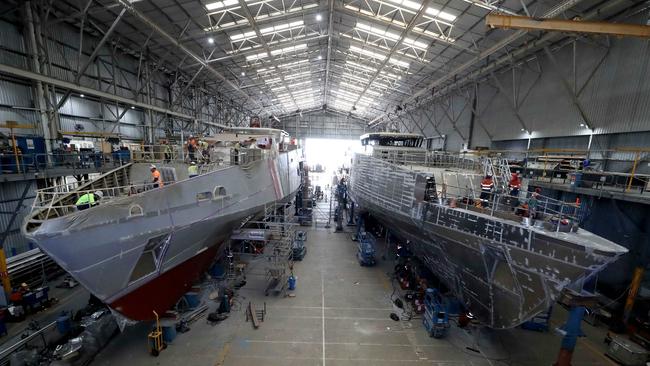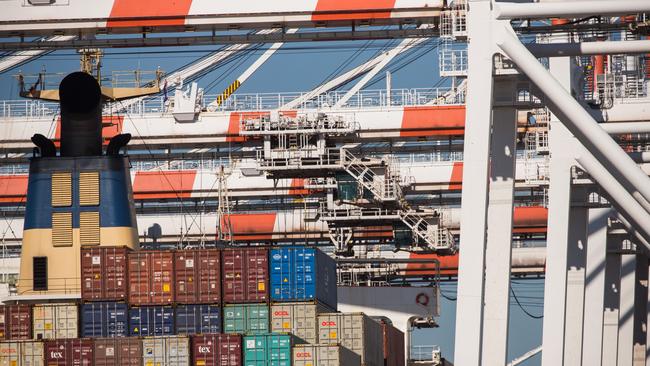Border breakdown, skills shortage, leads to cost blowout at Austal
Skill shortages and supply chain bottlenecks have been slowing work and blowing out costs across the economy.

Business
Don't miss out on the headlines from Business. Followed categories will be added to My News.
Listed shipbuilder Austal has become the latest to sound the alarm on closed borders, warning that access to skilled labour will sink its profit.
The warning came as the Reserve Bank said some Australian business were “opting to ration output” because of labour shortages.
Skill shortages and supply chain bottlenecks have been slowing work and blowing out costs across the West Australian mining sector for the past six months, with snap border closures blamed for artificially cutting access to a broader pool of Australian workers.
Investors on Tuesday savaged Perth-based Austal, pushing its shares 9 per cent lower after it posted an earnings downgrade blaming border blockages and higher costs. Austal closed at a two-year low of $2.12.
Austal’s comments have also stoked concerns of inflation flaring.
Last month contractor Perenti Global, which operates drilling, blasting and mining services businesses spanning surface and underground operations, said it expected reduced earnings for the next two financial years on the back of a tight labour market in WA and a rising Australian dollar.
Rio Tinto blamed a March quarter fall in production at its Pilbara mines on difficulties in finding skilled staff for scheduled maintenance, and Fortescue Metals Group has said cost blowouts at its Iron Bridge Magnetite project are partly the fault of difficulty in flying in interstate contractors.
Releasing its minutes for the June board meeting on Tuesday, the RBA said talks with Australian business “indicated that labour shortages were appearing in some parts of the economy.
“The reduction in access to foreign labour and reduced interstate mobility were cited by some firms as contributing factors,” the RBA said on Tuesday.
AI Group chief executive Innes Willox said border restrictions were hampering access to staff.
He said the government should look at relaxing quarantine requirements for fully vaccinated arrivals.
“Businesses not being able to get qualified and leading technicians in to build and maintain equipment, it is probably one of the biggest issues that businesses face at the moment,” he said.
Mr Willox said businesses were being slugged with higher input costs due to a “global supply chain bottleneck” and would be forced to pass on costs.
“They have no option,” he said.
“That’s why you’re seeing increases in prices of components and prices of finished goods.”

In a market update Austal flagged full-year earnings would now be in the range of $112m to $118m, down on the previous issued guidance of $125m.
Delays on Austal’s programs – which include contracts with the US Navy – were due to Covid-19-related border closures, travel restrictions and resourcing challenges that had sucked almost $10m out of the bottom line of the business, hitting its operations in Australia and The Philippines.
The profit downgrade comes in the wake of warnings flagged in the shipbuilder’s first-half report.
At the time Austal had warned the commissioning of vessels in Australia was taking longer than scheduled due to specialised commissioning engineers – often needed to install engines in giant ships – not being able to travel to Australia.
This had resulted in “additional costs and delays”, Austal said yesterday.
West Australian iron ore miner Mineral Resources, led by billionaire Chris Ellison, said access to labour was an increasing issue for industry.
“We are seeing skills shortages right across the chain from trainees through to professionals,” Mineral Resources executive general manager for energy Shelley Robertson told the APPEA conference in Perth on Tuesday.
“We’re really building up our pipeline of people to try and protect us from some of the industry swings.”
Beach Energy, developing the onshore Waitsia field in West Australia, said the oil and gas sector was watching the skills shortage.
“Do I recognise as an industry that we are facing those skill pressures? Absolutely. But I do think some of it comes back to longer-term how do we continue to train and develop and how do we get graduates in and how do we keep basically the industry thriving through the next generation,” Beach managing director Matt Kay told the APPEA conference.
Strike Energy, which is working on plans for a $2.3bn fertiliser plant in Western Australia’s Geraldton, said it had been able to find staff who had lost roles with some of the state’s energy majors.
“In the mining space you can barely find good quality and competent people because everyone is hiring so much,” Strike managing director Stuart Nicholls said.
“Yet we’ve just come out of a really tough time for oil and gas where some of the larger operators in WA have been unloading people and Strike has been the beneficiary.”
Yantian Port, in China’s prosperous Pearl River Delta near Hong Kong, is reportedly dealing with backlogs of up to 20,000 containers waiting for export.
On June 5 the port was reportedly accepting as few as 5000 containers a day, one-seventh its usual capacity.
Handling capacity has since recovered at the port, returning to 70 per cent of normal levels.
Yantian International said its preliminary expectation was to “fully resume its production goals by the last week of June”.
Additional reporting: Heide Han
Originally published as Border breakdown, skills shortage, leads to cost blowout at Austal


